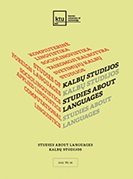Vertėjo lyties identiteto įtaka vertimo adekvatumui: šiuolaikinės prancūzų moterų rašytojų prozos vertimas į ukrainiečių kalbą
The Effect of the Translator’s Gender Identity on the Adequacy of Translation: Contemporary French Women’s Prose in Ukrainian Translations
Author(s): Lyudmila DiachukSubject(s): Gender Studies, Poetry, French Literature, Translation Studies
Published by: Kauno Technologijos Universitetas
Keywords: translator’s gender identity; French women’s prose; translation strategies; translator’s creative writing; adequacy of translation;
Summary/Abstract: The following article has revealed the influence of the translator’s gender identity on the adequacy of translation. This is especially noticeable in translations of the same text by translators of different sexes. This correlation is exemplified in the contrastive analysis of the translations of Marguerite Yourcenar’s novel “L’Oeuvre au Noir” carried out separately by Marta Kalytovska and Dmytro Chystiak. The results of this research demonstrate that translators succeed in achieving a balance in rendering original women’s style. In general, it is noteworthy that male translators used large lexical and stylistic resources of the Ukrainian language and applied the strategy of domestication in translation. Vadym Pashchenko repeatedly uses Ukrainian words and expressions, which makes his translation of Nathalie Sarraute’s novel “Les Fruits d’Or” more expressive. The elements of domestication are very typical for Anatoliy Perepadia’s translation of Sylvie Germain’s “Le Livre des Nuits”. His translation method is characterized by extensive use of Ukrainian phraseology, as well as neologisms and colloquial style. Female translators have closer gender-related sensitivity to a female author, but sometimes they deform to a certain degree the author’s plot and characters’ gender identification. The analysis shows that among Ukrainian translators there are many representatives who have their own literary style, in particular, Marta Kalytovska, Eugenia Kononenko, Dmytro Chystiak. Therefore, the question arises as to the effect of the translated prose on the writer’s own creativity. The creative style of Eugenia Kononenko is significant in this regard. She is well-known as a writer, translator from French and English, and a great fan of feminist ideas. This article reveals the influence of translated French women’s prose on Eugenia Kononenko’s own literary work.
Journal: Kalbų Studijos
- Issue Year: 2017
- Issue No: 31
- Page Range: 36-51
- Page Count: 16
- Language: English

